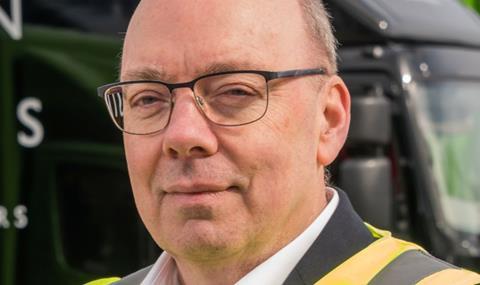
Justin Laney (pictured), general manager of central transport for John Lewis, believes the Siemens eHighway system is the most viable long-term solution for delivering electric power to HGVs.
The concept is currently being trialed in Europe and features overhead power lines in a designated lane and an active ‘pantograph’ that transmits energy to a truck’s electric motor. This can be connected to and disconnected from the contact wire either automatically or manually.
“For the longer term we’re very interested in the Siemens eHighway system,” Laney told motortransport.co.uk. “It’s ambitious but there are several sections of track around Europe and there’s already a proposal for Scotland. It’s on the DfT’s radar.
“You could cover all the UK's motorways and A roads for a fraction of the cost of HS2. It’s big numbers but not big enough to make it impossible.
“When you see it, you think it’s never going to work because nobody will invest in the infrastructure without the trucks - and truck companies won’t invest in something without an infrastructure. But when you actually look at it a bit deeper and ask what can really work for long distance heavy trucks, it’s the best solution and the most efficient way to deliver power to a vehicle as it’s driving along.
“It’s already known about by the FTA and the Centre for Sustainable Road Freight who we work closely with.”
Laney said the concept should also prove interesting to oil companies looking to recover lost revenue streams as hauliers transition away from diesel ahead of the government's 2050 net-zero emissions deadline.
Read more
- John Lewis Partnership to deliver zero emission fleet
- John Lewis Partnership commits to diesel-free HGV fleet by 2028
- Biomethane truck trial sees CO2 emissions slashed by 1,400 tonnes
“They’re worried they’ll lose their customer base if they can’t sell an alternative to diesel so they’re also very interested in EV charging and might be interested in investing into that kind of infrastructure," he said. “Likewise, electricity infrastructure companies might be interested in it.”
Laney went on to confirm that all its heavy duty trucks would be running on biomethane by 2028: "The entire fleet will be zero emission by 2045 and that probably means electric," he added. "We believe there will be solutions available by then. We're not naïve enough to think the plan won’t change, but the targets won’t. Although in theory it's by 2045, the vast majority will be achieved a long time before then.
"We’re quite happy if biomethane is the solution for us for the next 15 to 20 years, and it might be beyond that. It gives us two or three generations.
"Biomethane works very well and reduces carbon emissions by 83% versus diesel. It also reduces noise by roughly half. Drivers like it and there’s a good business case. It hits all the right buttons. It's been challenging to find trucks with the right range and we’ve jumped through a lot of hoops to partner with key people, but it's now a compelling argument to move to biomethane and away from diesel.
"We spent a long time with Imperial College, looking at different alternative fuels and found biomethane was the only one that was truly sustainable, gave that carbon benefit, was available in large enough quantities and had a business case. There's a short list of alternatives to diesel that actually work."
Laney said industry claims that simply switching to Euro-6 diesel was an adequate response to reducing emissions "depended on a company’s motivation for change".
"A modern Euro-6 diesel truck is OK in terms of air quality so the argument about diesel trucks operating in urban environments from a health point of view goes away with Euro-6 diesel," he said. "But what doesn’t go away is the global warming impact. Each diesel tractor will emit 100 tonnes of CO2 over a year. What we've seen in Australia can be connected to global warming."
He also admitted that the industry is currently "nervous of backing the wrong horse" when it came to alternative fuels.
"The secret is to move at the right pace," he said. "Otherwise you end up with vehicles you can't use. Or, as a manufacturer, a product you can't sell. If you move too slowly your competitors have moved on.
"Part of the success or failure is to pick the right technology. Look at the first generation of gas trucks back in the 1990s - and before that there was gas dual fuel. Companies invested a lot of money and in both cases it didn’t work out. You can understand someone having a bad experience and saying, 'it isn’t the way for me'. The first generation of electric vans didn’t work very well either.
"Or take the example of autonomy - if your competitor has a driverless truck and you haven’t you're at a commercial disadvantage. You need a pretty good crystal ball to look ahead and decide what people are going to want. I have a bit more sympathy for truck manufacturers than [Trevor Milton at] Nikola.
"That said, it's going to become more disruptive in the years ahead. You see that with the impact Tesla has had on cars. They’ve driven the market into much wider adoption of electric and you can see the same thing happening in the truck and van market."
Laney concluded by rejecting the findings of a recent report by Fraikin and MT which revealed that three-quarters of fleet operators thought the job had become "more stressful" in the last few years. "It’s becoming more fascinating,” he argued. “There are many more challenges in terms of looking at the future as well as the day-to-day operational stuff. You’ve got to have one eye on the horizon and one on what’s happening now. That’s what makes it interesting.”














